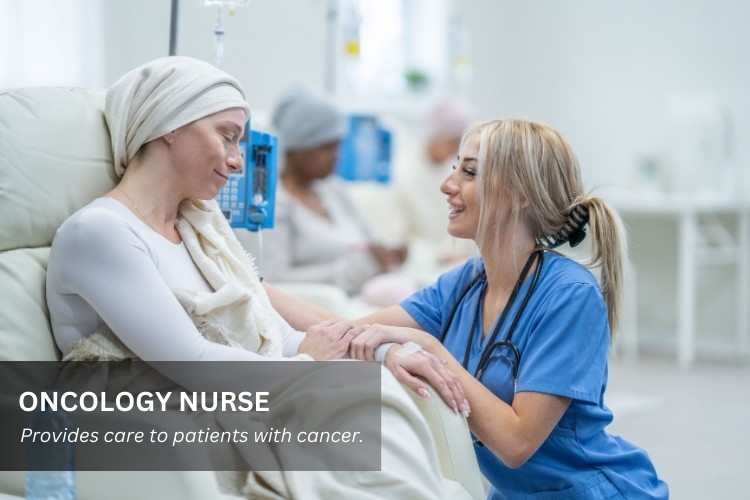Oncology Nurse
Healthcare Career Guide

Caring for patients with cancer requires a unique blend of clinical skill, emotional resilience, and compassionate support, qualities that define the role of an Oncology Nurse. These nurses assist with chemotherapy, symptom management, and patient education while providing comfort and continuity of care throughout the cancer journey. They work in hospitals, cancer treatment centers, outpatient clinics, and hospice settings as part of multidisciplinary care teams. Let's delve into the Oncology Nurse specialty and explore what it takes to thrive in this deeply impactful nursing role.
Overview
What Is an Oncology Nurse?
An Oncology Nurse is a Registered Nurse (RN) who specializes in caring for patients diagnosed with cancer. These nurses support individuals throughout the cancer journey, from diagnosis and treatment to remission, palliative care, or end-of-life support.
Oncology Nurses work in hospitals, cancer centers, infusion clinics, and hospice facilities. They administer chemotherapy, monitor side effects, manage symptoms, and provide emotional support to patients and families.
This career requires deep compassion, attention to detail, and a strong understanding of cancer treatments and their physical and emotional effects.
Education
How Do I Become an Oncology Nurse?
Becoming an Oncology Nurse requires a combination of traditional nursing education, clinical experience, certification, and specialized oncology training. Follow these steps to enter this challenging and rewarding healthcare career:
- Earn a Nursing Degree. Complete an Associate Degree in Nursing (ADN) or a Bachelor of Science in Nursing (BSN). A BSN is preferred for advanced oncology roles and leadership positions.
- Pass the NCLEX-RN. Obtain your nursing license by passing the National Council Licensure Examination for Registered Nurses (NCLEX-RN).
- Gain Clinical Experience. Work as a Registered Nurse (RN) in oncology units, hematology clinics, or palliative care settings.
- Obtain Oncology Nursing Certification. Earn the Oncology Certified Nurse (OCN) credential through the Oncology Nursing Certification Corporation (ONCC) to demonstrate specialty expertise.
- Continue Professional Development. Stay current with evolving cancer treatments, immunotherapies, and supportive care techniques through continuing education and conferences.
On average, it takes 4-6 years to become an Oncology Nurse, including education, licensure, and time spent gaining specialty experience. Certification enhances credibility and opportunities for advancement.

Average Salary
How Much Does an Oncology Nurse Make?
Salaries for Oncology Nurses vary by location, certification, and clinical setting. On average, an Oncology Nurse can expect to earn between $80,000 and $110,000 annually.
Average annual salary for an Oncology Nurse:
- Entry-level: $80,000 - $90,000 per year.
- Mid-career: $90,000 - $100,000 per year.
- Experienced: $100,000 - $110,000 per year.
The U.S. Department of Labor includes Oncology Nurses within general RN categories, reporting an average hourly wage of approximately $42.00. Assuming a 40-hour workweek, this equates to an annual salary of $87,360. The lowest 10% earn less than $36.00 per hour, while the highest 10% earn more than $50.00 per hour, resulting in a range of $74,880 to $104,000 per year.
Job Duties
What Does an Oncology Nurse Do?
Oncology Nurses care for patients undergoing cancer treatment and provide physical, emotional, and educational support. They coordinate care plans and manage complex medication regimens.
The most common job duties of an Oncology Nurse:
- Administering Chemotherapy and Treatments. Safely deliver chemotherapy, immunotherapy, and supportive medications following established protocols.
- Monitoring Side Effects. Observe for and manage treatment-related side effects such as nausea, fatigue, or infection risk.
- Providing Patient Education. Teach patients about diagnosis, treatment plans, medication safety, and symptom tracking.
- Assessing Patient Progress. Conduct regular physical and emotional assessments, monitor lab values, and report changes to the care team.
- Supporting Emotional Well-being. Offer counseling and guidance to patients and families dealing with the stress of a cancer diagnosis.
- Coordinating Multidisciplinary Care. Work with oncologists, social workers, dietitians, and palliative care teams to deliver holistic care.
- Providing End-of-Life Support. Deliver comfort care, educate families about hospice options, and help patients transition to palliative care when appropriate.
- Advanced Duties. Experienced Oncology Nurses may serve as nurse navigators, clinical trial coordinators, or oncology educators.
Oncology Nurses typically work in infusion centers, oncology departments, cancer hospitals, or hospice settings. Their role is critical to improving quality of life and supporting patients through one of the most challenging experiences of their lives.

Essential Skills
What Skills Does an Oncology Nurse Need?
Oncology Nurses require a combination of clinical proficiency, emotional resilience, and communication skills. These abilities help them deliver compassionate, evidence-based care to patients at various stages of cancer treatment.
Here are some of the skills an Oncology Nurse needs to succeed:
- Chemotherapy Administration. Understand pharmacology, safety protocols, and handling precautions for hazardous drugs.
- Patient Assessment. Identify early signs of complications, track progress, and adjust care accordingly.
- Symptom Management. Alleviate nausea, fatigue, mucositis, and other side effects of cancer treatment.
- Patient Advocacy. Represent patient needs and preferences during care planning and treatment decisions.
- Education and Communication. Explain complex medical information in a compassionate and clear manner.
- Emotional Support. Offer comfort and empathy to patients facing uncertain or difficult diagnoses.
- Team Collaboration. Work with interdisciplinary teams to provide coordinated, patient-centered care.
- Critical Thinking. Respond to rapidly changing conditions and make informed decisions during treatment cycles.
One of the biggest challenges of being an Oncology Nurse is supporting patients through physically demanding treatments and emotionally intense circumstances. However, the role is deeply meaningful, offering the chance to build trust, provide hope, and make a lasting impact on patients' lives.
Last updated: April 16, 2025
References:
- Registered Nurses. Bureau of Labor Statistics, U.S. Department of Labor. Occupational Outlook Handbook. Retrieved April 16, 2025.
- NCLEX Nurse Licensure Exam. National Council of State Boards of Nursing (NCSBN). Retrieved April 16, 2025.
- Oncology Nurse Specialty. Johnson & Johnson, Nursing Careers. Retrieved April 16, 2025.
- Oncology Nursing Society. Organizations can purchase membership, courses, books, and more on behalf of their employees. Retrieved April 16, 2025.
- Association of Pediatric Hematology/Oncology Nurses (APHON). Professional organization for pediatric hematology/oncology nurses and other healthcare professionals in this field. Retrieved April 16, 2025.
- Oncology Nurse Salary in the United States. ZipRecruiter, Healthcare Career Path. Retrieved April 16, 2025.
- Oncology Certified Nurse (OCN). Oncology Nursing Certification Corporation (ONCC), Certifications. Retrieved April 16, 2025.
- American Cancer Society. Cancer information, answers, and hope. Retrieved April 16, 2025.
- Oncology Nurse Job Description: Top Duties and Qualifications. Indeed, Healthcare Career Guide. Retrieved April 16, 2025.
- Role of the Oncology Nurse. National Library of Medicine (NLM), U.S. Department of Health and Human Services. Retrieved April 16, 2025.
- Oncology Nursing Career Overview: How to Become and What to Expect for a Career as an Oncology RN. Nightingale College, Nursing Career Guide. Retrieved April 16, 2025.
- Adult Oncology Specialty Certificate. University of Pennsylvania, Nursing Academic Programs. Retrieved April 16, 2025.
- What is an Oncology Nurse. Western Governors University, Nursing Career Guide. Retrieved April 16, 2025.


